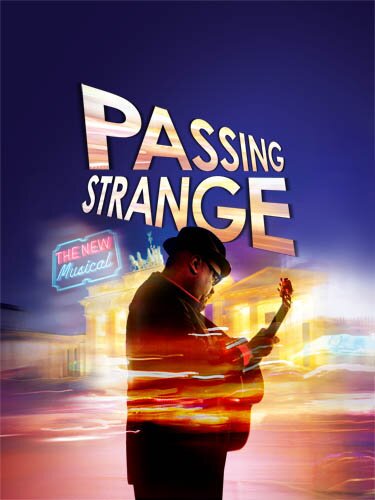 Since the 2007 Broadway musical Passing Strange launched them into the theatre scene Stew and his musical collaborator, Heidi Rodewald, have created music for Shakespeare productions, riffed on Broadway classics, and continued to develop original rock-driven works of theatre.
Since the 2007 Broadway musical Passing Strange launched them into the theatre scene Stew and his musical collaborator, Heidi Rodewald, have created music for Shakespeare productions, riffed on Broadway classics, and continued to develop original rock-driven works of theatre.
This month has been especially busy for he mono-monikered front-man of The Negro Problem and cynosure of Passing Strange. He and Rodewald are developing a musical, The Total Bent, which wrapped up a month-long test-run at NYC’s Public Theatre on St. Patrick’s Day weekend. Stagger Lee, another musical-in-development of theirs, received a staged reading at Repertory Theatre of St. Louis on Thursday, and Saturday night they played our own Neptune Theatre. Unsurprisingly Stew seemed a bit ragged around the edges with a head cold and some grumpy remarks about the challenges of making theatre and St. Louis. With the help of the unwavering Rodewald and an amazing horn section he soon found his groove and took the audience along for the ride.
A word about the venue: yes, the 1921 silent picture house is neither silent nor shows pictures. A ship-shaped snack bar greets patrons at the entrance and the smell of popcorn is still detectable, but the theatre seats are gone–replaced by café tables and upholstered folding chairs for this show. A spacious bar serves the back of the house and the flickering projector has been supplanted by a top-notch lighting system including a dozen moving lights, at least as many LED strips and more. The lighting updates also extend to the decorative side (Neptune’s face just got a bit scarier) and the sound was well balanced.
That Stew should perform in a space that is and is not a movie house seems fitting as he blurs the line between theatre and rock concert, even without his Tony-nominated cast from Passing Strange. Stew’s hands stayed busy pushing chord changes and rhythms that went from classic rock simplicity to challenging high-art complexity, but those hands also escaped the guitar throughout the show. They took a prominent role in directing the band in numbers that appeared partly, if not largely, improvised. The hands took flight to illustrate his articulate, thoughtful and sometimes down-right intellectual lyrics like a hula dance of heartbreak and race-politics.
Though the concert was advertised as songs from both Passing Strange and the new album, Making It, big Broadway rock numbers like “Amsterdam,” “Keys”, and “It’s Alright” were not included. Stew is very upfront about the downer tone of Making It, which he wrote with Rodewald about the break of their romantic relationship. The sad and bitter vein included songs like “Curse,” “Therapy Only Works if You Tell the Truth” and the Gatsby-flavored “Suzy Wong.”
The more upbeat “Black Men Ski,” is the only track from Making It that explicitly deals with the issues of race more prominent in Passing Strange as well as The Negro Problem’s debut album, Post Minstrel Syndrome. At Saturday’s show “Black Men Ski” stood out as an in-the-moment improv-extravaganza with Stew incorporating audience suggestions into his hyper-physical conducting.
The set also got some leavening with back catalogue numbers like “Gary’s Song,” which Stew wrote for an episode of SpongeBob SquarePants. He put down the guitar and pumped up the theatre chops in a choreopoem performance of “Kingdom of Drink” from the 2003 release, Something Deeper Than These Changes, but these were exceptions. Most of the concert, whether insightful or bitter, depended on the Making It material with driving grooves anchored by a horn section, most of whom doubled as an opening act.
That act, The Four Bags, mellowed the audience with thoughtful, mind-expanding tunes drawing from ambient electronica, folk song and even intimations of Stravinsky. Once removed to their corner, and with Stew at the helm, they filled the Neptune with big harmonies, aggressive rhythms and bravura solos, even when sousaphone doubled on accordion or baritone sax changed for clarinet or flute. This was not The Negro Problem with a horn section so much as two bands brought together in an active collaboration through Stew’s direction.
Stew and Rodewald will continue their music directing next week with the 11th Annual More Music at the Moore, Seattle Theatre Group’s training and performance program at the Moore Theatre. The performance by students in grades 3-12 will be at 7:30 p.m. on Friday, March 23rd.